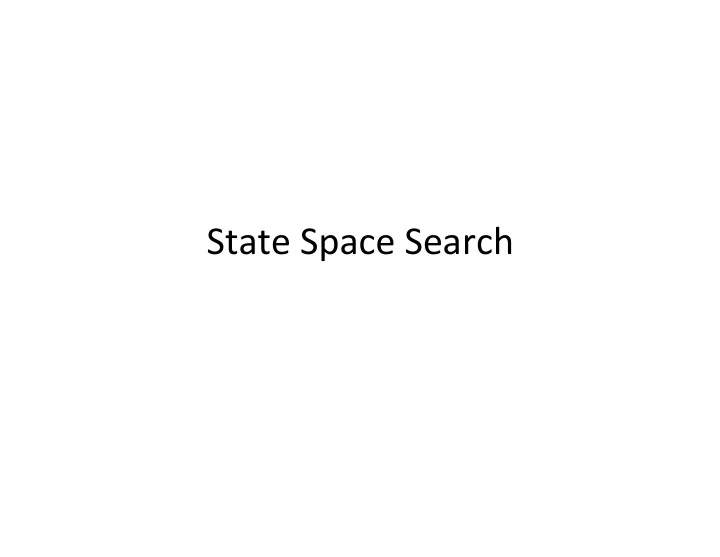

State ¡Space ¡Search ¡
Overview ¡ • Problem-‑solving ¡as ¡search ¡ • How ¡to ¡formulate ¡an ¡AI ¡problem ¡as ¡search. ¡ • Uninformed ¡search ¡methods ¡
What ¡is ¡search? ¡
Environmental ¡factors ¡needed ¡ • Sta$c ¡— ¡The ¡world ¡does ¡not ¡change ¡on ¡its ¡ own, ¡and ¡our ¡acEons ¡don ' t ¡change ¡it. ¡ • Discrete ¡— ¡A ¡finite ¡number ¡of ¡individual ¡ states ¡exist ¡rather ¡than ¡a ¡conEnuous ¡space ¡of ¡ opEons. ¡ • Observable ¡— ¡States ¡can ¡be ¡determined ¡by ¡ observaEons. ¡ • Determinis$c ¡— ¡AcEon ¡have ¡certain ¡ outcomes. ¡
Terminology ¡ • A ¡ state ¡is ¡a ¡set ¡of ¡properEes ¡that ¡define ¡the ¡ current ¡condiEons ¡of ¡the ¡world ¡our ¡agent ¡is ¡in. ¡ – The ¡enEre ¡set ¡of ¡possible ¡states ¡is ¡called ¡the ¡ state ¡ space . ¡ • The ¡ ini$al ¡state ¡ is ¡the ¡state ¡the ¡agent ¡begins ¡ in. ¡ • A ¡ goal ¡state ¡ is ¡a ¡state ¡where ¡the ¡agent ¡may ¡ end ¡the ¡search. ¡ • An ¡agent ¡may ¡take ¡different ¡ ac$ons ¡that ¡will ¡ lead ¡the ¡agent ¡to ¡new ¡states. ¡
FormulaEng ¡problems ¡as ¡search ¡ • Canonical ¡problem : ¡route-‑finding ¡ • Sliding ¡block ¡puzzle ¡ • 8 ¡queens ¡puzzle ¡ • Roomba ¡cleaning ¡ • AutomaEc ¡CS ¡172 ¡proof ¡compleEon ¡ • Solitaire ¡ • What ¡else? ¡
FormulaEng ¡problems ¡as ¡search ¡ • Define: ¡ – What ¡do ¡my ¡states ¡look ¡like? ¡ – What ¡is ¡my ¡iniEal ¡state? ¡ – What ¡are ¡my ¡goal ¡state(s)? ¡ – What ¡is ¡my ¡cost ¡funcEon? ¡ ¡ ¡ • How ¡do ¡I ¡know ¡how ¡"good" ¡a ¡state ¡or ¡acEon ¡is? ¡ ¡ ¡
FormulaEng ¡problems ¡as ¡search ¡ • SoluEon: ¡ – A ¡ path ¡between ¡the ¡iniEal ¡state ¡and ¡a ¡goal ¡state. ¡ – Quality ¡is ¡measured ¡by ¡path ¡cost. ¡ – Op+mal ¡solu+ons ¡ have ¡the ¡lowest ¡cost ¡of ¡any ¡ possible ¡path. ¡ ¡ ¡
• State ¡space ¡search ¡gives ¡us ¡graph ¡searching ¡ algorithms. ¡ • Are ¡we ¡searching ¡a ¡ tree ¡or ¡a ¡(true) ¡ graph ? ¡
OYen-‑confusing ¡point ¡ • There ¡are ¡two ¡simultaneous ¡graph-‑ish ¡ structures ¡used ¡in ¡search: ¡ – (1) ¡Tree ¡or ¡graph ¡of ¡underlying ¡state ¡space. ¡ – (2) ¡Tree ¡maintaining ¡the ¡record ¡of ¡the ¡current ¡ search ¡in ¡progress ¡(the ¡ search ¡tree ). ¡
Infrastructure ¡needed ¡ • A ¡node ¡n ¡of ¡the ¡search ¡tree ¡stores: ¡ – a ¡state ¡(of ¡the ¡state ¡space) ¡ – a ¡parent ¡pointer ¡to ¡a ¡node ¡(usually) ¡ – the ¡acEon ¡that ¡got ¡you ¡from ¡the ¡parent ¡to ¡this ¡node ¡ (someEmes) ¡ – the ¡path ¡cost ¡g(n): ¡cost ¡of ¡the ¡path ¡ so ¡far ¡ from ¡the ¡ iniEal ¡state ¡to ¡n. ¡ • FronEer ¡is ¡oYen ¡stored ¡as ¡a ¡stack, ¡queue, ¡or ¡ priority ¡queue. ¡ • Explored ¡set ¡is ¡oYen ¡stored ¡using ¡a ¡data ¡structure ¡ that ¡enables ¡quick ¡look-‑up ¡for ¡membership ¡tests. ¡
Uninformed ¡search ¡methods ¡ • These ¡methods ¡have ¡no ¡informaEon ¡about ¡ which ¡nodes ¡are ¡on ¡promising ¡paths ¡to ¡a ¡ soluEon. ¡ • Also ¡called: ¡ blind ¡search ¡ • QuesEon ¡— ¡What ¡would ¡have ¡to ¡be ¡true ¡for ¡ our ¡agent ¡to ¡need ¡uninformed ¡search? ¡ – No ¡knowledge ¡of ¡goal ¡locaEon; ¡or ¡ – No ¡knowledge ¡of ¡current ¡locaEon ¡or ¡direcEon ¡ (e.g., ¡no ¡GPS, ¡inerEal ¡navigaEon, ¡or ¡compass) ¡
How ¡do ¡you ¡evaluate ¡a ¡search ¡ strategy? ¡ • Completeness ¡— ¡Does ¡it ¡always ¡find ¡a ¡ soluEon ¡if ¡one ¡exists? ¡ • Op$mality ¡— ¡Does ¡it ¡find ¡the ¡best ¡soluEon? ¡ • Time ¡complexity ¡ • Space ¡complexity ¡
Search ¡strategies ¡ • Breadth-‑first ¡search ¡ – Variant ¡— ¡Uniform-‑cost ¡search ¡ • Depth-‑first ¡search ¡ • Depth-‑limited ¡search ¡ • IteraEve ¡deepening ¡depth-‑first ¡search ¡ – Variant ¡— ¡iteraEve ¡lengthening ¡search ¡
Breadth-‑first ¡search ¡ • Choose ¡shallowest ¡node ¡for ¡expansion. ¡ • Data ¡structure ¡for ¡fronEer? ¡ – Queue ¡(regular) ¡ • Suppose ¡we ¡come ¡upon ¡the ¡same ¡state ¡twice. ¡ ¡ Do ¡we ¡re-‑add ¡to ¡the ¡fronEer? ¡ – No. ¡ • Complete? ¡ ¡OpEmal? ¡ ¡Time? ¡ ¡Space? ¡
Recommend
More recommend